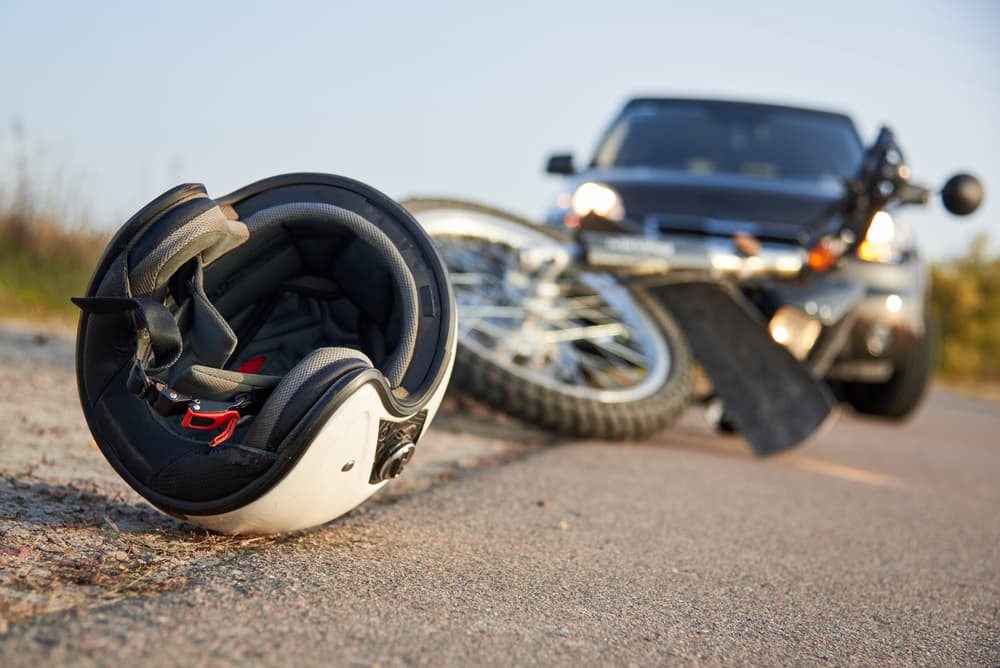Motorcycle accidents are among the most dangerous traffic accidents a person can experience. Due to the lack of protection motorcycles provide their riders, motorcyclists are vulnerable to severe injuries and death at rates far higher than those experienced by occupants of passenger vehicles.
Not only are motorcyclists put in greater jeopardy in the event of a collision, but the extent of their injuries is likely to be much more significant.
Recovering from a motorcycle accident can take a long time and require considerable expense. Many individuals hurt in motorcycle accidents deal with long-term injuries that have far-reaching effects on their lives. If you have been injured in motorcycle accident, reach out to San Diego motorcycle accident lawyer as soon as possible to seek legal compensation.
Schedule A Free Case Evaluation Today!
Top Locations of San Diego Motorcycle Accidents

With its sunshine, low precipitation, and beautiful scenery, San Diego and the surrounding area is a paradise for motorcyclists. Unfortunately, scenic beauty and ideal conditions don’t prevent motorcycle accidents from occurring.
According to the California Office of Traffic Safety, 353 people suffered injuries or death in San Diego motorcycle accidents in one recent year.
San Diego has some notably dangerous intersections and stretches of road that pose a higher risk of collisions than average:
- Interstate 15 between Scripps Poway Parkway and Miramar Way
- Interstate 5
- Freeway 67
- The intersection of University Avenue and 52nd Street
- The intersection of University Avenue and Marlborough Avenue
- El Cajon Boulevard
Generally speaking, freeways and intersections are the San Diego locations that present the most significant risk to motorcyclists.
The Dangers of Freeways
Freeways are dangerous to motorcyclists for several reasons. First, there’s the speed factor. Higher speed limits are inherently more dangerous because motorcyclists are so exposed, and when passenger vehicle drivers go excessively fast, this danger becomes even more extraordinary.
High speeds get particularly dangerous when combined with other reckless driving behaviors, such as rapid lane changes, impaired driving, tailgating, and failing to check blind spots. It’s easy to see how these factors can add up to a significant threat to motorcyclists.
In one common scenario, a motorcyclist may travel at a safe speed while observing the rules of the road.
Meanwhile, a passenger vehicle driver, perhaps distracted or under the influence of alcohol or drugs, fails to check their blind spot and switches lanes, colliding with the motorcyclist in the process and causing severe injuries.
Or perhaps the driver follows too close behind a motorcyclist who has to slow down unexpectedly due to debris on the road or a traffic stoppage up ahead. The passenger vehicle driver may have insufficient time to brake and might hit the motorcycle’s rear wheel, ejecting the motorcyclist.
These situations are sadly common and can result in severe injury or the death of the motorcyclist.
Why Intersections Are So Dangerous
Intersections pose similar dangers to motorcyclists, often due to many of the same factors that make freeways so hazardous. Distraction, speeding, and other reckless behaviors on the part of motor vehicle operators create dangerous and potentially fatal conditions for motorcyclists.
One of the most common situations that leads to collisions in intersections involves a vehicle operator making an unprotected left turn without observing a motorcycle moving toward them from the other direction. The driver attempts the turn, crosses into oncoming traffic, and collides with the motorcyclist, who had the right of way.
Left turns can also be dangerous when there are two turn lanes and a motorcyclist and passenger vehicle are attempting to navigate the turn simultaneously. A sideswipe collision can ensue if the passenger vehicle driver doesn’t notice the motorcyclist and fails to stay in their lane.
Additionally, because intersections tend to be busy, frequent traffic can create excessive wear and tear on the road’s surface. This leads to broken pavement, poor traction, potholes, standing water, and other conditions that are uniquely dangerous to motorcyclists.
Ultimately, while your lawyer will take any environmental conditions that contributed to your accident into account when evaluating your case, where your accident occurred has less of an effect on your compensation than how it happened and how it affected you.
What Causes Motorcycle Accidents?
In just one year, 5,579 motorcyclists died, and another 82,258 suffered injuries in accidents nationwide, according to the National Highway Traffic Safety Administration. These accidents occur every day, and while many causes contribute to them, the negligence of passenger vehicle drivers presents a significant risk to motorcyclists.
Drivers owe a duty of care to other people, motorcyclists included. This means they must avoid harming anyone through their actions or lack of action.
Some of the most common causes of motorcycle accidents include:

- Speeding
- Failing to check blind spots for motorcyclists when changing lanes
- Executing lane changes suddenly, erratically, or without signaling
- Failing to yield to approaching motorcyclists when making a left turn
- Driving while distracted or impaired
- Failing to leave sufficient distance when driving behind a motorcycle
Other factors can cause motorcycle accidents, as well. For example, rain and high winds can make accidents more likely. Road conditions can also cause accidents—construction zones, damaged or poorly maintained roads, and debris on roads may all make accidents more likely.
While external factors can contribute to accidents, when a vehicle operator acts with recklessness or a lack of regard behind the wheel and causes a collision with a motorcycle, they’re liable for any ensuing injuries and property damage.
Common Motorcycle Accident Injuries
Motorcycle accidents can cause catastrophic injuries. This is mainly due to motorcyclists’ unique vulnerability—motorcycles offer no protection, as they lack the enclosure, airbags, and seatbelts of passenger vehicles, and almost any collision involves the potential for direct contact with another vehicle and ejection from the motorcycle.
The odds of injury in motorcycle accidents are very high, as are the odds of your injuries being serious or fatal. There’s a high likelihood of certain types of injuries in motorcycle accidents.
Some common injuries include:
- Head injuries
- Traumatic brain injuries
- Back and neck injuries
- Spinal cord injuries
- Cuts and bruises
- Broken bones
- Road rash
- Internal injuries
- Severe bleeding
- Crushing injuries
- Paralysis
- Death
Even when you wear a helmet and protective gear, you can suffer severe injuries in a motorcycle accident. Recovering from these injuries can involve lengthy hospitalization, multiple surgeries, rehab, physical therapy, and other treatments.
Plus, you’ll likely have to take time away from work for an extended period. And none of this guarantees a full recovery—you may need to deal with the effects of a motorcycle accident for the rest of your life.
This is why you must consult a motorcycle accident attorney who can advise you of your legal rights and help you explore your options, including pursuing compensation for your injuries and other expenses.
Who Is Liable for Your Motorcycle Accident?
The process of seeking compensation begins with identifying the party or parties liable for your injuries. Your attorney will examine the evidence of the accident, potentially consulting medical and accident reconstruction experts to get their insight into how the accident occurred and how it will affect your future.
Determining liability in an accident injury case often comes down to proving negligence on the part of the vehicle driver or another party. To do so, an attorney will establish that the other party owed the injured victim a duty of care and breached that duty, resulting in the victim’s injuries and other losses.
For instance, all motorists must obey the rules of the road and drive with caution to avoid causing others harm. Breaking traffic rules or driving in a reckless or careless way is often a breach of the duty of care that motorists owe other road users.
For example, let’s say a person was drinking and got behind the wheel. Driving while under the influence of alcohol is a breach of the duty of care. Alcohol impairment compromises a driver’s ability to control their vehicle, increasing the chances of an accident and putting other road users at risk.
While other motorists are often liable for injuries in motorcycle accident cases, other parties can be liable depending on the circumstances.
For instance, if poor road conditions or potholes cause a motorcycle crash, the government entity or agency responsible for road maintenance could be liable for injuries and other crash-related losses.
The manufacturer of a defective or faulty vehicle part could also be liable for injuries from a crash. For example, if a collision occurs due to faulty brakes, the maker of the parts or the vehicle could be responsible.
Determining Compensation in a Motorcycle Accident Case
When you begin the process of seeking compensation for your motorcycle accident injuries, it’s natural to wonder just how much compensation you might recover.
Every case is different, and the amount will depend on the specific details of the accident, the extent of your injuries, and the likelihood that you’ll be able to make a full physical recovery.
The compensation from a motorcycle accident case often falls under two general categories: economic damages and non-economic damages.
Economic damages compensate you for specific, quantifiable losses, chiefly your medical expenses and any income you lost due to the accident. These can cost considerable sums—medical expenses might include costs associated with emergency care, medical transportation, hospitalization, surgery, rehab, physical therapy, long-term care, and medications.
If you’re out of work while you recover, you can seek compensation for lost income. Additionally, if your injuries prevent you from returning to work in the same role, require you to abandon your career for a different industry, or prevent you from working altogether, you can seek compensation for lost earning capacity and future earnings.
Non-economic damages, meanwhile, compensate you for harder to quantify losses. Your attorney will factor these losses—physical and emotional pain and suffering, loss of quality of life, and other adverse effects of a motorcycle accident—into the compensation you seek.
Your attorney will pursue the maximum amount of funds in your case based on their determination of what would constitute full compensation for your economic and non-economic damages.
How a Motorcycle Accident Lawyer Can Help
The process of seeking compensation after a motorcycle accident caused by someone else is often complex and time-consuming.
When you’re injured and dealing with medical appointments, missing work, and worried about your finances, you shouldn’t have to worry about navigating the legal system, too.
Instead, an attorney can handle all the aspects of your case, putting their knowledge and resources to work for you. An attorney with experience representing motorcycle accident victims will understand California law and how it applies to your case.
You can trust them to handle all the complicated legal matters that follow a serious collision, including:
- Researching the accident and gathering evidence to build a strong case on your behalf
- Negotiating with insurance companies in pursuit of a fair settlement
- Arguing your case in court if the other party refuses to render an acceptable settlement offer
- Handling all paperwork associated with your case
- Providing regular updates on your legal battle
- Helping you understand your rights and walking you through your legal options
- Providing the peace of mind that comes with knowing your case is in skilled hands
Motorcycle accident attorney understand that financial matters are a significant source of stress following an accident. With this in mind, many of them will work on a contingency basis, meaning you won’t pay any attorney fees unless your attorney recovers compensation for you.
Consult a Motorcycle Accident Attorney

If you suffered injuries in a San Diego motorcycle accident due to someone else’s negligence, an attorney can help you recover the compensation you deserve and allow you to focus on healing. They’ll help you understand your legal rights and options and guide you through the process of seeking justice.
Contact an experienced San Diego personal injury attorney today to get started.

